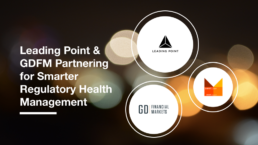Increasing data product offerings by profiling 80k terms at a global data provider
“Through domain & technical expertise Leading Point have been instrumental in the success of this project to analyse and remediate 80k industry terms. LP have developed a sustainable process, backed up by technical tools, allowing the client to continue making progress well into the future. I would have no hesitation recommending LP as a delivery partner to any firm who needs help untangling their data.”
PM at Global Market Data Provider
GDFM & Leading Point Partnering for Smarter Regulatory Health Management

GDFM and Leading Point collaborate to deliver innovative and efficient regulatory risk management to our clients and through the SMART_Dash product; enabling consistent, centralised, accessible regulatory health data to assist responsible and accountable individuals with ensuring adequate transparency, for risk mitigation decision making and action taking. This is complemented by a SMART_Board suite for Board level leadership and a more detailed SMART_Support suite for regulatory reporting teams.
We are delighted that SMART_Dash has been shortlisted in 3 categories in this year's prestigious RegTech Insight Awards in Europe, which recognises both established solution providers and innovative newcomers, seeking to herald and highlight innovative RegTech solutions across the global financial services industry.
GD Financial Markets Head of Regulatory Compliance Practice and SMART_Dash Co-creator Sarah Peaston "Centralised, consolidated, consistent regulatory health transparency and tracking is key to identifying and managing regulatory and operating risk. I am delighted that SMART_Dash has been recognised as a new breed of solution that practically assists Managers, Senior Managers and Leadership with managing their regulatory health through the provision of the right information, at the right level to the right seniority”.
Leading Point CEO Rajen Madan "Our vision with SMART_Dash is to accelerate better regulatory risk management approaches and vastly more efficient RegOps. As financial services practitioners we are acutely aware of the time managers spend trying to make sense of their regulatory and operating risk areas from a multitude of inconsistent reports. SMART_Dash enables the shift to an enhanced way of risk management, which creates standardisation and makes reg data work for your business. We are very grateful to the COO, CRO and CFOs whom have contributed to its development and help the industry move forward”.
GDFM and Leading Point are rolling out the SMART_Dash suite to the first set of industry consortium partners progressively in H1 2021, and thereafter open to a wider set of institutions.
Leading Point has been shortlisted in the Data Management Insight Awards 2020
We are so thrilled to have been shortlisted for the 2020 Data Management awards, vote for us in the ‘Most Innovative Data Provider’ category
From designing a solution SMART_Dash that specifies, quantifies and visualises risks arising from firms’ non-financial risk to a legal reference data-based digital repapering process for LIBOR, to target state data-driven op model implementations in anti-financial crime and treasury to ESG data readiness, Leading Point is always striving for a best-in-class solution for their clients.
Leading Point’s proprietary platform modellr allows change leaders to capture and visualise process, systems, controls, organisation and data flows in real-time. Our reimagined box-in-box view allows change and technology teams with accelerated design and delivery phases driving project initiation to completion time down by 70% and allows for continuous performance measurement of businesses’ op models.
Being recognised in this way is a huge testament to the Leading Point family and the hard work everyone has put into our data offerings this year. We have reached many milestones in our growth journey this year and are very much looking forward to the months ahead and to our next Data Kitchen event!
These prestigious awards are designed to recognise leading providers of data management solutions, services, and consultancy to capital markets.
If you believe in the power of human-centric data-driven op models in our industry please show your support for us by completing this short survey. You have until Monday 21 September to cast your vote.
Founder and CEO Rajen Madan comments on our inclusion:
“We are delighted to be shortlisted for the 2020 Data Management Awards. This is a testament to our expert practitioner-led delivery successes and our solutions focus on the business user, as a newer breed of service providers to the industry. We have grown immensely with some great partners, clients and our industry advisors. We are truly thankful to have them in our journey”
Angela Wilbraham, CEO of A-Team Group, which hosts the Data Management Insight Awards, added that being shortlisted was “in itself a fantastic achievement amongst such strong competition.”
Voting closes Midnight (GMT) Monday 21st September 2020.
The winners will be announced on Thursday 3rd December 2020.
Who we are:
Leading Point helps financial services businesses thrive in new realities by combining financial experience with data and innovation. We provide data-led solutions and seamless integrations in Regulatory Compliance, Risk Assurance, KYC/AML, Corporate Treasury, Information Security and Trading. We specialise in helping our clients implement digital user journeys and data-driven operating models. We work with some of the world’s largest global financial institutions, challenger fintech and tech innovators with a combination of AI/ML/ RPA and DLT.
Time to Reset?
We see the varnish from the old oil painting of government, enterprise, business and leadership fade a bit every day. 2020 has already shown us how interconnected our world has become - a true Butterfly Effect. Interconnectivity is not a bad thing. It is the fragility, the brittleness of modern economies that is cause for concern. I believe this is a result of critical imbalances we have allowed to build up, without questioning. Now as the varnish from the old oil painting comes off, we have a once in a decade opportunity to reset and tackle these imbalances. To make bold brush strokes.
Where can we start?
Big Government or Small?
Do we need a Big Government or Small? The term ‘Big Government’ here is not intended to be derogatory. We see national priorities and decisions that don’t match that of the city, the village, or the council. Great plans and budgets that don’t translate into change on the ground. Equally, in the face of this crisis, we see barriers breaking down. A C-19 COVID Symptom tracker app, which each of us can use, allows a judicious allocation of scarce testing and treatment resources at a national and grassroot level. The opportunity is to examine the flow from the national to the level of council. Provide transparency and allow engagement. If it doesn't exist it should be created. Direct channels for us citizens to highlight problems, propose solutions, be data-driven and monitor implementation. It is not a question of a big government versus small. It is one that works transparently that matters.
Public or Private Sector Enterprise?
A key debate going into 2020 was about which sector provides a better service, is more efficient with resources - private or public sector enterprise? Think about the NHS, Transport, Energy, Manufacturing, Financial Services, Agriculture, Technology and Utilities. Healthy arguments and examples are cited to show the merits of both public and private sector. I believe the public-private argument completely misses the point. Whether an enterprise provides a good service or poor, spends judiciously or not is not down to public or private sector. It is down to some key principles - how it is governed, how accountable is its team and partners, does it know what good service looks like and is it equipped to provide these services. Enterprises can be funded by either public or private sector resources. The opportunity ahead is in data and tech enabled service delivery models, going digital. And public-private collaboration funding models can ignite innovation and value added services. The key to provide good service is not public or private sector, it is to provide a good service!
Role of Business
Businesses are standing out in two ways in these times. Those that care about their employees and partners and are doing their bit to help their communities and those that pretend to. People will remember businesses that care. Those that don't, will fall out of favour. That most of our essential "front line" staff in the face of a pandemic are paid low/ minimum wages is cowardly. It shows the scale of imbalances we have allowed to build up and seem to be comfortable with. Colleagues in maintenance, cleaning, nursing, restaurant, retail, agriculture, driving, security, manufacturing and teaching professions amongst others need to be compensated fairly. The opportunity here is to go after skewed compensation models, unviable business models and poor productivity with vigour. The tax structures reportedly exploited by big tech and conglomerates are ripe for reform and become principle driven. Likewise business owners having billions and calling for government bailouts or larger profitable companies using furlough schemes to offload their responsibilities to the public should face the consequence. This is a failure of law and the will of successive governments. Let us get it right this time. Bashing businesses and entrepreneurs is not the answer. They are born from the risk-reward equation and are the lifeblood of any economy.
Lessons in Leadership
As much as it is tempting to draw leadership lessons from the current pandemic, they are unique to the situation and not a one size fits all. But I find the war analogy somewhat flawed. The chancellor of the exchequer, Rishi Sunak said “we will be judged by our capacity for compassion and individual acts of kindness” – does that sound like a war? If anything, the lesson for future leaders is to be that much more focused on ensuring their team’s wellbeing, ensuring they are equipped with relevant resources. Good leaders will understand the importance of the informal and the invisible stuff – collaboration, unconventional thinking, meaningful conversations and problem solving over formal organisation structures. The world we have to navigate in is increasingly unpredictable and non-linear, command and control team structures and top-down change will not work.
Everyday we are seeing concrete examples of what is working in business, government and leadership and what is not. We can allow 2020 to be one mired in tragedy, lost lives, lost livelihoods and failed businesses or we can seize the once in a decade opportunity to reset and create the government, the enterprise, the business and leaders that we want and have lacked for some time. This is within reach.
What steps do you think will help create better business, government and leaders?
Please feel free to comment and share. Keep well!
Change leader with over 20 years’ experience in helping financial markets with their toughest business challenges in data, operating model transformation in sales, CRM, Ops, Data, Finance & MI functions, and delivery of complex compliance, front-to-back technology implementations. Significant line experience. Former partner in management consulting leading client solution development, delivery and P&L incl. Accenture. Specialities – Operating Models, Data Assets, Compliance, Technology Partnerships & Solutions in Capital Markets, Market Infrastructure, Buy-Side, Banking & Insurance.
"2020 has already shown us how interconnected our world has become - a true Butterfly Effect."
"It is not a question of a big government versus small. It is one that works transparently that matters."
"Businesses are standing out in two ways in these times. Those that care about their employees and partners and are doing their bit to help their communities and those that pretend to."
"We can allow 2020 to be one mired in tragedy, lost lives, lost livelihoods and failed businesses or we can seize the once in a decade opportunity to reset and create the government, the enterprise, the business and leaders that we want and have lacked for some time"
LIBOR Signals Need for New Approaches to Legal Data
The Scope of LIBOR Remediation is the Problem
Time is now of essence – with the end of 2021 deadline looming, financial institutions need to reduce their ‘stock’ of legacy LIBOR contracts to a minimum as a matter of priority, writes Rajen Madan, CEO, Leading Point.
The challenge is of course colossal. Firms need to find every reference to IBORs embedded in every contract they hold; update each contract with fallback provisions / reflect the terms of the alternative reference rate they are migrating to; and communicate the results with clients.
LIBOR’s retirement potentially impacts over $350 trillion of contracts and requires all LIBOR transactions (estimated at over 100 million documents) to be examined and most likely repapered. LIBOR is embedded in every asset class – mortgages and retail loans, to commodities, derivatives, bonds and securities.
It’s estimated that large banks may be exposed to more than 250,000 contracts directly referencing LIBOR maturing after 2021, and indirectly exposed to many thousands more embedded in servicing activities, supplier agreements and such.
Only 15 percent of Financial Institutions are ready to deal with this volume of contract remediation, deal restructuring, and repapering activities required for the scale of their legacy contract back-book; 14 of the world’s top banks expect to spend more than $1.2 billion on the LIBOR transition.
Firms that have comprehensive visibility of their legal contract information via retained structured data, can avoid 80 percent of the typical repapering process, and focus their efforts on the remaining, critical, 20 percent.
LIBOR Repapering Not a ‘Find and Replace’
The repapering of contracts isn’t as straightforward as a ‘Find and Replace’ on legal terminology referencing LIBOR.
Risks are many including conduct, legal, prudential and regulatory. Consider ‘conduct’ risk. In the UK, the Treating Customers Fairly (TCF) regime is particularly concerned with how customers are affected by firms’ LIBOR transition plans. Before contracts can be updated, firms will need to ensure that LIBOR linked products and services have ‘fair’ replacement rates that operate effectively.
Similarly, there’s prudential risk. When the underlying contracts change, firms may find that the instruments they rely on for capital adequacy purposes may no longer be eligible, potentially even resulting in a sudden drop in a bank’s capital position. Similarly, there are several Counterparty Credit, Market, Liquidity, and Interest Rate Risks that will need to be reflected in firms’ approaches.
LIBOR is proving to be a real impetus for financial institutions to use technology that, to be honest, has been available in the marketplace for a long time now.
Mindset Change is Needed to Manage Legal Data
Most historic repapering exercises have involved hastily identifying the documents impacted, outsourcing the difficult issues to law firms (at huge cost) and throwing manpower (again at substantial cost) at the problem to handle the contract updates and communications with counterparties. The exact same process has been repeated for every repapering project. Despite the substantial costs, many financial institutions still don’t meet the deadline. MiFID II is an example.
With ample evidence of regulators continually tightening their grip on financial institutions through reform – alongside an increasingly dynamic global business environment (e.g. LIBOR, Brexit) – it is time organisations acknowledged and accepted repapering as a ‘business as usual’ activity.
A change in mindset and a smarter approach is needed to manage legal data. Financial institutions need to ensure that LIBOR or indeed any future business repapering exercise does not compromise client well-being or negatively impact client experience. For instance, to accurately model the financial risk firms’ portfolios are exposed to via LIBOR when transitioning to a new rate, they need a way to directly link, say, multiple cash and derivative contracts to a single client. Furthermore, in an environment where most firms are product driven, the scenario of multiple repetitive communications, requests for information and re-papering contract terms looms on the horizon for firms’ customers.
It is heartening to see that LIBOR is beginning to pique the interest of financial institutions to develop a long-term vision to create smarter capabilities that will deliver business advantages in the future.
Stephanie Vaughan, Global Legal AI Practice Director at iManage RAVN and ex-Allen & Overy, recently observed, “LIBOR is proving to be a real impetus for financial institutions to use technology that, to be honest, has been available in the marketplace for a long time now. While they may have dabbled with it in the past, due to the scale of the LIBOR remediation and the constantly changing regulatory challenges, it has finally hit home that such projects are a drain on resources and are delivering no business value.”
Financial institutions have started every repapering project (e.g. MiFID II, Dodd Frank, Margin Rules) from scratch including going through the entire process of determining the clients, what the terms of engagement are, when the contracts expire and so on.
Technology Can Make Repapering ‘Business as Usual’
A strategic approach to managing legal data requires all stakeholders in a financial institution to come on board – from business units and the compliance department through to legal operations and the General Counsel. This is instrumental to ensuring genuine cross-functional recognition and support for strategic directional change.
Financial institutions need to build a strong, technology-supported foundation for remediation projects. Thus far, financial institutions have started every repapering project (e.g. MiFID II, Dodd Frank, Margin Rules) from scratch including going through the entire process of determining the clients, what the terms of engagement are, when the contracts expire and so on.
Hereafter, with LIBOR and Brexit, extracting, classifying, storing and maintaining all these data points as structured, base level information on customers on a single technology platform, will provide institutions with capabilities to quickly understand their exposure, assign priorities and flexibly make contractual changes in tune with evolving requirements.
This approach is proven. Firms that have comprehensive visibility of their legal contract information via retained structured data, can avoid 80 percent of the typical repapering process, and focus their efforts on the remaining, critical, 20 percent. Financial institutions will then also be well poised to take advantage of new bolt on capabilities that leverage artificial intelligence for application to specific use-cases – which in turn can deliver business value from contract search, contract classification, clause management, to real time analytics, contract generation and integration with operational, risk and compliance systems.
The opportunity with more effective legal data management is huge and realisable. Building and incrementally strengthening capability through the strategic and proactive use of technology is potentially the only way for financial institutions to adapt to their new regulatory and business environment.
The repapering of contracts isn’t as straightforward as a ‘Find and Replace’ on legal terminology referencing LIBOR.
Leading Point FM CEO Rajen Madan on Fintech Focus TV
Leading Point FM Founder & CEO Rajen Madan has been featured on Harrington Starr's Fintech Focus TV where he discussed the company's capabilities and solutions, the world of data, problems in the FS industry. He provides an overall picture of new technology and trends in the market with a growing focus on delivery and execution in companies!
How will the FCA business plan impact organisations over the next two years?
Leading Point of View
How will the FCA business plan impact organisations over the next two years?
Introduction
The FCA has recently issued its business plan (1) and focus for the upcoming four quarters. Kicking off with some stats – a mix of sobering and positive, the paper gives a clear outline of its proposed, cross-sector, regulatory oversight. One of the greatest challenges for the industry at present is the implementation of MiFID II provisions.
The FCA makes the point that this will facilitate the introduction of ‘major reforms to improve resilience and strengthen integrity and competition in wholesale markets’. Furthermore, work around market abuse will be enhanced. We highlight notable elements of the business plan and their implications for organisations, below.
Cybersecurity
Across all financial sectors lies the risk of cyber-attacks. With the impending implementation and governance of the General Data Protection Regulation, and potential fines of up to 4% of company revenue, organisations’ technological and operational resilience must be second to none. The FCA deems these qualities pivotal pieces of the cyber security jigsaw; it aims to police cyber capabilities and monitor financial crime and all major outages
during the upcoming year.
Senior Managers and Certification Regime
Whilst 2015/2016 saw banks and insurers bring about the operational changes borne out of SMCR, during 2017/2018, the FCA plans to oversee the resulting culture and governance of this significant shift in responsibility. Currently under consultation is the extension, to be implemented by 2018, of SMCR to all firms covered by FSMA. This would cement the prevailing accountability of senior managers’ individual areas of business within the industry.
Customer Engagement & Competition
The theme driving the most recent directives and regulations is placing the ball in the customers’ court. The dramatically changing financial landscape is being molded by the General Data Protection Regulation, the Payment Services Directive 2, to name but a few. The Open API world further allows the customer to have greater choice and engagement with their banking decisions. The FCA is likely to zero in on firms’ development in digitisation and automation and stewardship of customer data with a critical eye, to ensure there is no abuse.
Buy-side | Asset Management
MiFID II implications are beginning to take shape, however there is much to be done. The FCA recognises MiFID II as post-crisis regulation; it is driving reforms that will promote cross-sector market integrity and competition,
and consumer protection. Firms’ annual budgets will now, more than ever, be targeted towards improving IT systems and infrastructure, develop data capabilities, and ensure operational risk is kept at bay.
Leading Point Financial Markets brings compelling value at the intersection of Data, Governance & Compliance, and Digital and Operating Model Change initiatives. If you would like to further consider any of these impacts on your organisation, please contact saskia.blake@leadingptconsulting.com or rajen.madan@leadingptconsulting.com.
(1) https://www.fca.org.uk/publications/corporate-documents/our-business-plan-2017-18
Top 10 Moments in Financial Markets 2017 – Leading Point
What an eventful year 2017 was. It’s hard to narrow it down to a handful of moments, but I believe the below were pivotal moments with a high degree of impact on Financial Markets in the mid-term.
- 10 years since the financial crisis – reconstruction of the global financial machinery
Last summer marked a decade since the global financial crisis – what has changed (for the better) in financial markets in that time? The 2017 narrative focussed on incumbents vs challengers; legacy models declined, business models became forward-thinking and began to use tech to enhance customer experience. We saw the honest beginnings of how customers could really start to control their money, and also concreting the concept of financial inclusion. Conversely, 2017 saw serious, high-profile data breaches with Uber and Equifax losing client data to hackers; businesses striving to meet requirements of GDPR before May ’18 deadline to ensure customer privacy, enhance data protection and making a move on digital identity (watch this space).
- Open Banking – the Cathedral and the Bazaar, the Regulation and the Business, Tech and Partnerships
In February, the UK government confirmed the PSD2 timetable – a promising step. Banks must share all the data they hold on customers with competitors (if the customer so wishes). The concept of Payment Information Service Providers (‘PISP’) & Account Information Service Providers (‘AISP’) was born. This is posited to help customers get the best deals. In October, start-up Fintech Bud shared the stage with HSBC UK – paving the way for collaborative relationships between incumbent banks (the ‘CMA 9’) and agile start-ups who realise their vision via technology. Changing the face of banking, the likes of Starling Bank, Monzo, Revolut, Yolt and peers created a splash in the market. The digital-only challenger Starling Bank launched their beta version in March, offering a current account experience without branches or a banking license. It’s Jan ’18 – the compliance with PSD2 may have happened, but the real revolution in open banking (‘the bazaar’) has only just started. Looking at neat API maps here is very different from traversing the terrain with complex dynamics at play.
- Bitcoin and Blockchain
Satoshi Nakamoto created bitcoin as a stateless Digital Currency nine years ago, but in 2017 it gained traction and cryptocurrency markets dominated the public imagination. This set the tone for a competitor, Ether – an ERC20 token on the Ethereum blockchain. Tech commentators felt the need to predict the ‘crash’ of bitcoin – it went up to a high of $19,055 on 11 December; today it sits at $9,700. Distributed Ledger Technology definitely saw more than an uptick in 2017 – Global Blockchain Benchmarking Study by Garrick Hileman showed that the Banking and Finance industry has the largest number of identified DLT use cases. Is Bitcoin really delivering on these promises? We think not. But there is for sure a revolution underway in the way we interact with money, store value, and build ecosystem trust.
- Data Knowledge Graphs
In October, Thomson Reuters used Big Data management principles and Machine Learning techniques, to create their Knowledge Graph – a trusted data source and model for customers to leverage, build their enterprise solutions on top of, and benefit in new, connected ways from the breadth of their open platform – imagine leveraging 2 billion relationships for a comprehensive view: “The largest Big Data challenge our customers face today is managing, and making sense of, their unconnected data” said Geoffrey Horrell of Thomson Reuters in an excellent presentation at EDM Council. It is possible to make a start before perfecting Data Governance and Data Quality.
- Interest Rate Rise by MPC – first since crisis and stress testing
To meet the 2% inflation target, the Bank of England Monetary Policy Committee (MPC) at its meeting on 1 November voted by a majority of 7-2 to increase Bank Rate by 0.25 percentage points, to 0.5%. The 2017 stress testing results for UK’s top banks included a scenario in which the banks would deal with a seven year downturn and increased pressure from FinTechs. Are we good? The open banking revolution and its impacts on SME financing could potentially cause a greater ripple in incumbent banks.
- Brexit – busy with legal entity bingo as worst-case scenario looms
There is uncertainty in financial services due to the, as yet, unknown terms of the Brexit Deal the UK will strike on 29 March 2019; this has caused many CEOs to plan for the ‘worst case scenario’. Legal entities and potential staff moves dominated the headlines. The banking industry was pushing for as much clarity as possible, rather than be left with a ‘cliff-edge’ or ‘chaotic’ Brexit. London sought to retain its status as Europe’s financial capital, but the possibility of regulatory ‘equivalence’ was not quite the ‘passporting’ the industry has enjoyed to date. 2017 could not confirm nor deny what the future would be, while we continue to await the deal terms.
- The Budget from Philip Hammond / Patient Capital
The Budget included a commitment to shore up the UK’s position in technology and innovation post-Brexit. It also set out plans to establish a dedicated subsidiary of the British Business Bank to become a leading UK-based investor in “patient capital” across the UK – something written about a lot in the financial press in 2017. HM Treasury’s Patient Capital Review was a framework to support innovative firms to access the finance, needed to scale up. Xavier Rolet, who stepped down from LSEG in November, was a staunch advocate of SMEs. LSEG’s ‘1,000 Companies To Inspire Britain’ set to drive long term investment in SMEs. Xavier explained; “What they [SMEs] need is long-term ‘patient’ capital, like equity, where people seek investment to grow their business either through individual investors, on capital markets, or through crowdfunding and peer-to-peer platforms.”
- Insurance Industry’s Moment of Truth – Ogden Rate Reform
20 March 2017 saw the PIDR (Personal Injury Discount rate) otherwise known as the Ogden Rate reduced by 3.25 percentage points from 2.5% to -0.75%. The 2001 discount rate influences the lump sum paid to successful personal injury claimants; it was set with reference to the return rate of index linked gilts (ILGs). After several years of campaigning, and borne out of the historically poor performance of the UK economy, the PIDR was reduced to below zero to provide an uplift in compensation: otherwise, the capital sum awarded to the claimant, if invested, would underperform against inflation. This had a shock effect on the market with billions of additional costs in premiums and compensation rises expected. In September, the insurance industry won a major victory by persuading the government to reform the Ogden Rate. It provided some breathing space while the disruptive effects of InsureTechs start to bite, and LMG progressed the London Market Modernisation agenda.
- Passive vs Active Investment
There became a divided camp in 2017 with some insightful commentary in the FT. The ETF market soared with players such as BlackRock leading the way, their operational costs being inherently lower than active fund management – Smart Beta became a rising trend with lower management costs and competitive expense ratios – will this consolidate in 2018? Did active asset management take a real blow? The figures suggest a move towards more of a balance between passive and active investment. In October, borne out of the rise of passives, Fidelity UK announced a new ‘fulcrum’ variable fee model based on performance. The manager would charge a higher fee when delivers outperformance net of fees, but lower if performance meets or is below benchmarks. A step forward to value active management and reduced management fees. 2018 will see these developments play out.
- MiFID II – Major Regulatory Overhaul
Last and not the least. 2017 was the year gifted to the Financial Services industry, as the MiFID II implementation deadline was extended to 3rd January 2018. Capital Markets saw their biggest regulatory overhaul yet, to create a more transparent and accountable industry. Now it’s gone live, the market is scrambling to ensure it will pass the tests in: best execution, information to clients, surveillance, monitoring, governance, reporting, and transparency. Billions in capital and effort were spent achieving a compliant state, and it looks likely efforts will continue well into 2018, even 2019. What wholesale changes will MiFID II precipitate and what will be the unintended consequences? 2018 promises to be a fascinating year.
Did you feel strongly about any other moments that should have made this list?
Please comment and share below freely.
Thank you.
Rajen Madan
#LeadingPointFM #FinancialCrisis #FinServ #CustomerExperience #FinancialInclusion #DataBreaches #GDPR #CustomerPrivacy #DataProtection #DigitalIdentity #PSD2 #RetailBanking #Data #OpenBanking #SatoshiNakamoto #bitcoin #DigitalCurrency #cryptocurrency #ERC20 #Ether #Ethereum #blockchain #BigData #MachineLearning #KnowledgeGraph #Fintech #Brexit #Deal #PatientCapital #HMTreasury #PIDR #OgdenRate #InsureTech #smartbeta #LMG #MiFIDII #CapitalMarkets #Compliance #Operating Models #BestExecution #DataGovernance #DataQuality
Rules of Data
On 24 October, it was reported that the Financial Conduct Authority launched an investigation into the US credit checking company Equifax; almost 700,000 Britons had their personal data misappropriated between mid-May and July this year. The FCA gave evidence on this matter to the Treasury Select Committee on 31 October because of the significant public interest. The FCA has the power to fine Equifax, or strip it of its right to operate in the UK, if it is found to have been negligent with its customers’ data. With European Union governments formally stating that cyber-attacks can be an ‘act of war,’ data protection cannot be taken seriously enough. The Equifax data breach is by no means a solitary data breach – several large organisations such as Dun & Bradstreet, Verifone, Whole Foods, Deloitte, DocuSign, Yahoo! are already part of the mix.
The Government is aligning domestic data legislation with the European Union in an effort at continuity, despite our plans to leave the EU. The Data Protection Bill, is proof that the Government seeks to keep the UK au courant with the newest data law of EU provenance.
The number of internet users is now close to 4 billion. Businesses continue to move their products and services online in order to service their customers. Data continues to grow exponentially and will persist in its travel far and wide – enabled by technology proliferation. The EU’s General Data Protection Regulation (‘GDPR’) has been precipitated by acute necessity. Companies need to review and revise their approach to privacy, security and governance of their data. A holistic, data protection framework is needed that is centred on the customer and encompasses their interactions, experience, sentiment, along with those of advocacy groups, shareholders, and regulators. This is a non trivial exercise and requires interventions at the mindset, policy, information governance & security and process levels, along with enabling technology.
Businesses are heading in the right direction with GDPR, but there is still a long way to go. Implementing this change with the right spirit is fundamental to building trust with customers and partners. Leading Point’s experience helping organisations with these requirements suggests that while significant compliance hurdles exist, a risk-based approach that focuses on five core areas, will be instrumental to success.

1. Give your customers control over their data – a mindset change
Bearing in mind the territorial scope of the GDPR – across the current 28 EU member states, plus, anyone dealing with the EU, most teams within organisations will benefit from the ethos behind the Regulation. A mindset shift from owning your customers’ data to stewarding your customers’ data is required. Give your customers control over their data. Any legal or natural person processing data must believe in the spirit of this sea change – the need
to assume responsibility for stewarding your customers’ data and to provide them with confidence in your processes. GDPR expands on the list of ‘rights’ each data subject is afforded: the right to be informed, the right to
access data records, the right to data erasure, to name a few. Tone at the top matters immensely.
2. Achieve Data Protection by Design
Which department is leading your organisation’s GDPR compliance efforts? A cross-functional team will help in deploying a holistic data protection framework. To start with, the focus must be on classification of the data, its
supply chain and its governance. Therefore, leveraging existing data management initiatives to embed data privacy requirements can really help in ‘data protection by design’. In practical terms, companies need a clear picture on: ‘what types of data do they hold on their customers;’ ‘which types of data is sensitive and requires enhanced security levels;’ ‘who has access to customers’ sensitive data;’ ‘where is this data processed and distributed;’ ‘how does it flow;’ ‘what is its quality;’ and ‘are their checks and controls in place around its flow and access’? The rules are more stringent now, as companies establish the depth of customer data – their interactions, experiences, sentiments – what impressions are left in an organisation’s data stores. The definition of personal data and its inherent breadth has been redefined – ‘Personal data shall be adequate, relevant and not excessive in relation to the purpose or purposes for which they are processed.’ And so the notion of data minimisation is born. We believe that while there are increasing numbers of quick-fix GDPR solutions in the market, achieving data protection goals is less about technology, and more about energising the organisation into becoming 100% data aware.
Building trust in your data will allow for effective process and controls for data protection, security and governance.
3. The Art of the Process
Focus must be on the ‘process’ exercise – visibility of customer journeys – which processes interact with customer data and the ensuing data lifecycle. Knowing which functions have client-facing processes and ensuring these are
adapted is called for. Threading through specific processes for data collection, data storage, data sharing, access requests and breaches is the focus. Having a command of what happens to personal data, who is involved in gathering it, and responding to Subject Access Requests is important, not least because you will have only a month to respond and cannot routinely charge the current £10. What steps to take in the event of a data breach, how to manage contracts which hold personal data: these are all explicit in the Regulation. For all data processors, we must double down on education and training – on policies, on data governance, on processes and new rules of data. This means highlighting a consistent approach to the different scenarios. Surely the best protection is a body of staff that is wholly informed?
4. Integrating data protection with a risk-based approach
By taking an inventory of obligations to customers via existing contracts and business agreements, organisations can start to manage their stated responsibilities linked to customer data and its management and use. This is a
quick-win.
Data classification and governance exercises will highlight the sensitivity, breadth and depth of data, the access and use of the data held. Data flow will highlight the data processors and third-parties and internal functions involved. Data quality will highlight where data management controls are required to be shored up. In turn, this will flag up priority remediation exercises on customer data.
The aforementioned ‘process’ exercise will highlight key customer-facing process changes, or a requirement to deploy specific data processes referenced by GDPR. Organisations can road-test these processes against the required process turn-around times. For example, data breaches must be reported within 72 hours, and as mentioned above, data subject access requests – one month. Involve your customer services team actively with data protection and security breach scenarios – this will build memory and promote mindset change.
The overarching governance in an organisation will be a key cog in the data protection ecosystem; the Regulation has duly led to the genesis of the Data Protection Officer. Enabling these responsibilities with existing data management governance responsibilities, and appointing data champions, can be an effective approach. Data protection is indisputably everyone’s responsibility, so the emphasis must be on organisational cooperation.
5. Cascading to Third Parties & a Cloud
Third party contracts and the framework that dictates how these are established, must wholeheartedly reflect any changes to the requisite data protection and security obligations. A compliance policy which standardises how third party contracts are established can also be a useful instrument. Data transference should be shored up with model contractual clauses, which allow all parties to clearly realise their responsibilities. We are alive to the persistent risk of cyber attacks, so it is crucial to remember that your data on the cloud is a business issue, as well as an IT issue. Are you fully apprised of where your business stores its data; on the premises, in the cloud, or both? The increasing trend to shift data and infrastructure to a public or private cloud no doubt presents an economic benefit and technology road map for some organisations. But make no mistake, organisations are accountable for their customer data content, its usage, and their security policy for cloud-based storage. Measures such as encryption, pseudonymisation and anonymisation will help, and should be employed as a matter of course, as well as remaining open to select technologies that help underpin cyber defence.

To conclude
When implementing change, evidence-based decision making shouldn’t be the only strategy; knowing which cogs in an organisation interlink cohesively in practice will greatly assist in a robust framework that threads through to
a mindset shift, policy, data, process and third parties. To reinforce an earlier perspective, data is only growing. So are data breaches and cyberattacks. The garnering of our data to feed algorithms and ‘machine learning’, borne
out of the Silicon Valley revolution, is leading to inevitable change in our lives, but we must strive for a democratic jurisdiction for our data. Organisations must give customers control of their data and the confidence in their data
management processes. Rather than penalty-based scaremongering, think of this as an opportunity to build your brand, to send a robust message to your customers and partners, demonstrating care and respect of their data.
To close, a soundbite from the Information Commissioner’s Office: ‘Data protection challenges arise not only from the volume of the data but from the ways in which it is generated, the propensity to find new uses for it, the complexity of the processing and the possibility of unexpected consequences for individuals.’
Leading Point Financial Markets brings compelling value in the intersection of Data, Compliance, Governance and Operating Model Change initiatives.







